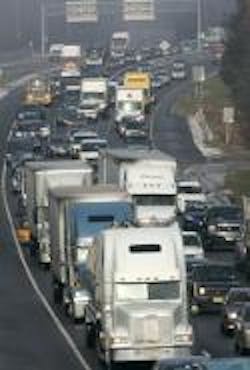“Transport is intrinsic to societal activity, and one of its greatest enablers. But all too often transport is taken for granted [while] societal demands on transport are constantly increasing. Transport systems must be adapted to better serve us all, but these systems are complex, and not easy to change.” –Jack Short, secretary general, International Transport Forum
It is perhaps the supreme irony that the transportation systems that allow the economies of the world to function and which allow the daily lives of millions of people to function continues gets shoved to the back seat on the bus in terms of public policy.
You need look no farther than the now oft-delayed six-year replacement for the Safe, Accountable, Flexible, Efficient Transportation Equity Act: A Legacy for Users (or “SAFETEA-LU”) that expired in 2010. Work on the funding mechanism for large swaths of the U.S. highway, railroad, ports, and aviation networks that move people and freight nationwide and worldwide keeps getting punted on down the road as Congress keeps trying to figure out how to divvy up a shrinking pile of dollars.
The thing is that transportation makes huge waves in all facets of our daily lives, from the air we breathe (truck, locomotive, ship, and plane exhaust all enter the atmosphere) and the price of commodities we buy (seen the price of gasoline and diesel lately?) to how we get kids to school while getting food to market.
Yet societies as a whole largely take the vital role transportation plays in all of this for granted. For example, people don’t seem to get the connection between reducing tailpipe emissions and how that affects the price of the cars they drive or the freight costs for the food they eat. And while people may champion vehicles powered by electricity and natural gas, there aren’t huge lines at dealerships to buy them.
These are just some of the issues the upcoming global summit of transport ministers from nations across the planet will try to address. The meeting – called Transport for Society: Debating Mobility for the 21st Century – will host transport ministers from the 52 member countries of the International Transport Forum (ITF), a group within the Organization for Economic Cooperation and Development (OECD), May 25-27 in Leipzig, Germany, to try and address just some of the many pressing transport issues on the horizon.
“Future transport systems will have to meet the aspirations of about 9 billion people, most of whom will live in cities. In addition, rising incomes will place high expectations on transport services,” noted Jack Short (at right), the ITF’s secretary general.
“A world without the very real daily benefits of mobility has become unimaginable. But all too often transport is taken for granted and societal demands on transport are constantly increasing,” he explained. “Transport systems must be adapted to better serve us all, but these systems are complex, and not easy to change. Opportunities for more open, effective dialogue on the development of transport systems should be pursued in order to facilitate a better understanding throughout society of transport issues.”
Short added that the transportation continues to place growing demands on global resources, including energy and the environment – demands that are becoming so large that it is imperative for transport to function as efficiently as possible.
“Efficiency” is the big watchword here, something all the stakeholders within the global transportation industry are taking to heart. For example, listen to remarks made by Tom Linebarger, president and COO of global diesel engine maker Cummins Inc., at the 2011 Mid America Trucking Show just last week. He stresses that making engines – specifically truck engines – more efficient on a global basis will be a critical part of his company’s startgey going forward.
It goes back to comments by ITF’s Short that investments in transport systems need to be maintained, as they underpin the creation of wealth and the growth of incomes of which people aspire.
“That’s why this year’s summit in Leipzig is an opportunity for transport leaders from around the world to debate and strengthen the sector’s role in human development,” he said.
Hopefully, then, this “meeting of the transportation minds” can help foster more public recognition of this critical role transportation plays in global society today.
One can hope, at least.
